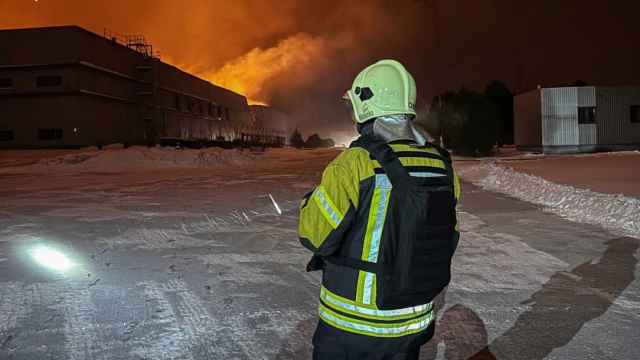BERLIN — A meteor exploded in the sky above Russia on Friday, injuring hundreds of people as its fragments fell to the ground in the Ural Mountain city of Chelyabinsk. Here's a look at those objects in the sky:
Q: What's the difference between a meteor and a meteorite?
A: Meteors are pieces of space rock, usually from larger comets or asteroids, which enter the Earth's atmosphere. Many are burned up by the heat of the atmosphere, but those that survive and strike the Earth are called meteorites. They often hit the ground at tremendous speed — up to 30,000 kilometers an hour, according to the European Space Agency. That releases a huge amount of force.
Q: How common are meteorite strikes?
A: Experts say smaller strikes happen five to 10 times a year. Large impacts such as the one Friday are rarer but still occur about every five years, according to Addi Bischoff, a mineralogist at the University of Muenster in Germany. Most of these strikes happen in uninhabited areas where they don't cause injuries to humans.
Q: Is there any link to the asteroid fly-by that took place later Friday?
A: No, it's just cosmic coincidence, according to European Space Agency spokesman Bernhard Von Weyhe, who says Asteroid 2012DA14 is unrelated to the meteorite strike in Chelyabinsk.
Q: When was the last comparable meteorite strike?
A: In 2008, astronomers spotted a meteor heading toward Earth about 20 hours before it entered the atmosphere. It exploded over the vast African nation of Sudan, causing no known injuries. The largest known meteorite strike in recent times was the "Tunguska event," which hit Russia in 1908. Even that strike, which was far bigger than the one that happened over Russia on Friday, didn't injure anyone. Scientists believe that an even larger meteorite strike may have been responsible for the extinction of the dinosaurs about 66 million years ago.
Q: What can scientists learn from Friday's strike?
A: Bischoff says scientists and treasure hunters are probably already racing to find pieces of the meteorite. Some meteorites can be very valuable, selling for up to $670 per gram depending on their exact composition. Because meteors have remained largely unchanged for billions of years — unlike rocks on Earth that have been affected by erosion and volcanic outbreaks — scientists will study the fragments to learn more about the origins of matter.
Q: What would happen if a meteorite hit a major city?
A: Scientists hope never to find out, but they're still trying to prepare for such an event. Von Weyhe, the European space agency spokesman, says experts from Europe, the United States and Russia are already discussing how to spot potential threats sooner and avert them.
"It's a global challenge and we need to find a solution together," he said. "But one thing's for sure, the Bruce Willis "Armageddon" method won't work.
Related articles:
A Message from The Moscow Times:
Dear readers,
We are facing unprecedented challenges. Russia's Prosecutor General's Office has designated The Moscow Times as an "undesirable" organization, criminalizing our work and putting our staff at risk of prosecution. This follows our earlier unjust labeling as a "foreign agent."
These actions are direct attempts to silence independent journalism in Russia. The authorities claim our work "discredits the decisions of the Russian leadership." We see things differently: we strive to provide accurate, unbiased reporting on Russia.
We, the journalists of The Moscow Times, refuse to be silenced. But to continue our work, we need your help.
Your support, no matter how small, makes a world of difference. If you can, please support us monthly starting from just $2. It's quick to set up, and every contribution makes a significant impact.
By supporting The Moscow Times, you're defending open, independent journalism in the face of repression. Thank you for standing with us.
Remind me later.





